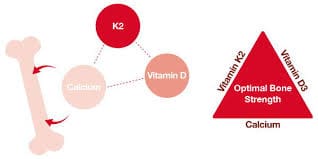Vitamin D and K2 are two essential nutrients that play important roles in maintaining optimal health. Vitamin D is commonly known as the sunshine vitamin, as our bodies can produce it when our skin is exposed to sunlight. Vitamin K2, on the other hand, is less well-known but equally important for maintaining healthy bones and cardiovascular health. In this article, we will explore the benefits of vitamin D and K2, why they complement each other, and why taking a vitamin D/K2 supplement may be beneficial for your health.
Benefits of Vitamin D
Vitamin D plays a critical role in many physiological processes, including bone health, immune function, and regulation of calcium and phosphorus levels in the blood. One of the most well-known benefits of vitamin D is its ability to promote bone health. Vitamin D helps to increase calcium absorption in the gut, which is necessary for the formation and maintenance of strong bones. In addition, vitamin D is important for muscle function and may help to reduce the risk of falls in older adults.
Vitamin D also plays a critical role in immune function. Research has shown that vitamin D can help to modulate the immune system, reducing the risk of infections, including respiratory infections such as the common cold and flu. Vitamin D deficiency has been associated with an increased risk of autoimmune diseases, including multiple sclerosis, type 1 diabetes, and rheumatoid arthritis.
Benefits of Vitamin K2
Vitamin K2 is a lesser-known nutrient that plays a critical role in maintaining healthy bones and cardiovascular health. Vitamin K2 works in conjunction with vitamin D to direct calcium into the bones and teeth, where it is needed, and away from the arteries, where it can contribute to arterial calcification.
Studies have shown that vitamin K2 supplementation may help to improve bone density and reduce the risk of fractures in postmenopausal women. In addition, vitamin K2 has been shown to improve cardiovascular health by reducing arterial calcification and improving arterial elasticity.
Complementary Roles of Vitamin D and K2
Vitamin D and K2 work together in several ways to promote optimal health. As mentioned earlier, vitamin D helps to increase calcium absorption in the gut, while vitamin K2 directs calcium to the bones and teeth, where it is needed. Without sufficient vitamin K2, calcium can accumulate in the arteries, leading to arterial calcification and an increased risk of cardiovascular disease.
In addition, vitamin D and K2 have complementary roles in immune function. Vitamin D helps to modulate the immune system, while vitamin K2 has been shown to have anti-inflammatory effects. Together, these nutrients may help to reduce the risk of infections and chronic diseases, including autoimmune diseases and cardiovascular disease.
Benefits of Taking a Vitamin D/K2 Supplement
While sunlight exposure and dietary sources are the best ways to obtain vitamin D and K2, many people may not be able to get enough from these sources alone. For example, those who live in northern latitudes may not get enough sunlight exposure during the winter months, and certain dietary restrictions may make it difficult to get enough vitamin K2 from food sources.
Taking a vitamin D/K2 supplement may be beneficial for those who are at risk of deficiency or who are unable to get enough from sunlight and dietary sources. In addition to promoting bone and cardiovascular health, vitamin D/K2 supplementation may also help to reduce the risk of infections, improve immune function, and reduce inflammation.
When choosing a vitamin D3 and K2 combination, it is important to select a high-quality product that contains the optimal form and dosage of these nutrients. Vitamin D3 is the preferred form of vitamin D, as it is more effective at raising blood levels than vitamin D2. Vitamin K2 is available in two forms: MK-4 and MK-7. Both forms have been shown to have health benefits, but MK-7 has a longer half-life and may be more effective at directing calcium to the bones and teeth. Therefore, a supplement that contains vitamin D3 and vitamin K2 MK-7 is likely the best choice for those looking to optimize their bone and cardiovascular health.

Recommended for enhanced benefits
When it comes to optimizing your vitamin intake, the combination of vitamin D3 and K2 is often recommended for enhanced benefits. Vitamin D3 aids in calcium absorption, while vitamin K2 helps ensure that calcium is properly utilized, directing it to the bones and teeth. To make the most of this synergistic relationship, choosing the best vitamin D3 and K2 supplements is crucial. Look for high-quality brands that provide the appropriate dosages of both vitamins in a convenient combination. Additionally, timing is important. The best time to take vitamins K2 and D3 is generally with a meal that contains some healthy fats, as these vitamins are fat-soluble and absorption can be improved in the presence of dietary fat.
Vitamin D and K2 are two essential nutrients that play complementary roles in promoting optimal health. Vitamin D is important for bone health, immune function, and regulation of calcium and phosphorus levels, while vitamin K2 directs calcium to the bones and teeth and promotes cardiovascular health. Taking a high-quality vitamin D/K2 supplement may be beneficial for those who are at risk of deficiency or unable to get enough from sunlight and dietary sources. With the right supplementation and a healthy lifestyle, we can ensure that we have the nutrients necessary to promote optimal health and well-being.
Should I take D3 and K2 at same time?
Yes, it is generally recommended to take vitamin D and vitamin K2 together. These two vitamins work synergistically and have complementary roles in the body. Vitamin D helps with calcium absorption and utilization, while vitamin K2 helps ensure that calcium is directed to the right places, such as the bones, and not deposited in soft tissues, like arteries. Taking both vitamins together can optimize their benefits and support overall bone and cardiovascular health.
Should I take vitamin K or K2 with vitamin D?
When taking vitamin D, it is advisable to take vitamin K2 rather than vitamin K. Vitamin K2 is more specifically involved in calcium metabolism and has a greater impact on directing calcium to the bones and teeth, thus supporting bone health. Vitamin K1, on the other hand, is primarily involved in blood clotting. So, for the purposes of supporting vitamin D’s role in calcium utilization, it is recommended to take vitamin K2.
Is Vitamin K necessary with Vitamin D?
While it is not strictly necessary to take vitamin K with vitamin D, it is beneficial to do so. Vitamin D helps with calcium absorption, and vitamin K2 helps ensure that the absorbed calcium is utilized properly. Vitamin K2 directs calcium to the bones and teeth while preventing its accumulation in soft tissues, which can have implications for cardiovascular health. Therefore, combining vitamin K2 with vitamin D can enhance the overall effectiveness of vitamin D in calcium metabolism.
Who should not take vitamin K2?
In general, Vitamin K2 is considered safe for most people when taken in appropriate doses. However, individuals who are taking anticoagulant medications, such as warfarin (Coumadin), should exercise caution and consult their healthcare provider before supplementing with vitamin K2. Vitamin K can affect blood clotting, and any changes in vitamin K intake may require adjustments to medication dosage. It is important to discuss vitamin K2 supplementation with a healthcare professional if you are on blood-thinning medications or have any underlying health conditions.










